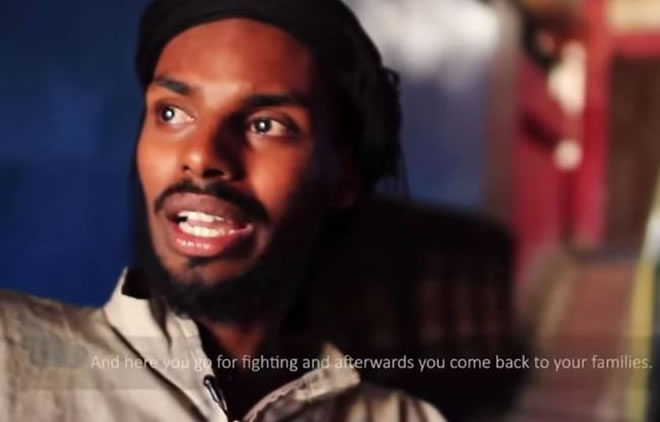
Hussein Faisal Ali, who goes by the alias Abu Shuaib al-Somali, appears in an ISIL video posted on YouTube. Ali, son of Somaliland's Justice and Welfare Party chairman Faisal Ali Warabe, left his home in Finland to join ISIL fighters. [Snapshot from YouTube video]

Shukri Mohamed
Saturday, September 6, 2014
advertisements
Somali clerics say they are worried about Somali youth who are leaving their homes in Europe, Canada and the United States to join the "Islamic State of Iraq and the Levant" (ISIL).In the latest such incident, reports circulated August 15th that Somali-Canadian citizen Farah Mohamed Shirdon, 21, the nephew of the former Somali Prime Minister Abdi Farah Shirdon, had been killed in Iraq while fighting on behalf of ISIL.
It was unclear when Shirdon left Canada to join the extremist group, but he appeared in an ISIL video posted online in April in which he burned his Canadian passport.
On August 5th, Faisal Ali Warabe, chairman of Somaliland's Justice and Welfare Party, confirmed to reporters that his son Hussein Faisal Ali had appeared in a video using nom de guerre Abu Shuaib al-Somali and claiming to have left his home in Finland to join ISIL fighters.
"We believed in our child, but some people have now radicalised him," Warabe said.
SOMALI CLERICS: ISIL IS NOT FIGHTING ON BEHALF OF ISLAM
Sheikh Nur Barud Gurhan, deputy chairman of the Somali Association of Islamic Scholars, said ISIL is tarnishing the Islamic faith and cautioned Somali youth against being tricked by the group's propaganda.
"We do not see ISIL as [a group] fighting on behalf of the religion. [The fact that] they are butchers who cut up the flesh of human beings is sufficient to see they are evil," he told Sabahi. "It is unfortunate that Somali youth are traveling to fight for such people."
Gurhan said a lack of knowledge about Islam was the main reason young people are being convinced to fight for ISIL. He called on clerics to teach youth about the religion in a correct way and to take responsibility for saving those who have been misled.
"They have no idea where they are going and who the people are that they are going to join," he said. "They are joining those men after they are brainwashed through religious songs and incitement."
Gurhan urged youth who are thinking about joining ISIL and those who have already joined to think again about the consequences of their actions.
"When you get on a plane and then call your parents from Iraq or Syria, you will shock them. That is not something that has any basis in Islam, so fear God and have mercy on [your parents]," he said. "You will have worshiped enough if you are obedient to them."
"We heard ISIL destroyed the graves of God's prophets and the companions of the Prophet," said Sheikh Abdirahman Ahmed al-Ansari, head of Ahlu Sunna Wal Jamaa in southern Somalia.
"I would say to the young Somali man who is joining those people, 'Your country, people and religion need you. Do not be misled by the deception of the devil'," he told Sabahi.
Sheikh Mohamed Ali Nur, imam of Masjid Tauba in Mogadishu's Hawlwadag district, said he was shocked when he heard some Somalis had joined ISIL extremists.
"Somalis were already suffering greatly because of the pain al-Shabaab has inflicted upon them," Nur told Sabahi. "It is a sad matter that [in addition to that] some youth are now joining these merciless men."
"We shall pray to God on their behalf, pray for them in mosques, [pray] for God to guide our young people to the correct path and keep them away from the ones who are brainwashing them," he said.
INVESTING IN AWARENESS CAMPAIGNS
In a conference that took place in Mogadishu in September 2013, Somali clerics issued a fatwa condemning al-Shabaab.
Even though the fatwa has not been implemented fully, Gurhan of the Somali Association of Islamic Scholars said the conference was not in vain.
"Even though there is lack of money and ability, I believe that was a useful conference because we showed the Somali people within the country and abroad what al-Shabaab and extremism are and that they have nothing to do with religion," he told Sabahi. "We are now planning to launch an extensive awareness campaign to educate the people on what the correct religion is."
Omar Dahir Sheikh Abdirahman, director of the Centre for Moderation and Dialogue in Mogadishu, said the extremism that is spreading among Somali youth would have been nearly extinct if the agreements reached at the conference were strengthened and implemented correctly.
"As a follow-up to the conference, I believe the people should be educated and the government should invest heavily in spreading [messages about the dangers of extremism]," Abdirahman told Sabahi. "If there is no extensive programme that is fully funded […] nothing can be done."
Abdirahman called on the government to consult on this issue with clerics, intellectuals and the organisations that have committed to fighting extremism.
"People have to constantly be awakened through the media such as on TV and radio stations. I would also suggest publishing little books that warn against extremism to be distributed among the people," he said. "In essence, this issue needs a lot of effort."